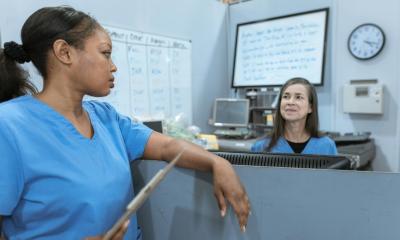Male and female Doktors
Whether it was a constitution of sorts writ on cavernous rock at the dawn of mankind no one knows. What is clear is that since the inception of the first rudimentary societies the male always expected to rule and the female to follow and obey.


Despite the fact that the woman has proven time and again that she can perform as well as her male counterpart in most sectors, this ideology still holds today, albeit more subtly, even in one of the most developed of continents like Europe.
In the medical field this scenario still holds strong. Although the number of female doctors in European hospitals and in medical schools – UK (70%), Germany (61%) – has risen steadily since the 1990s, men still dominate the profession with their presence and ideology thus making it logistically difficult for female counterparts to thrive, especially if they also have a family to tend. In Germany the number of female doctors has risen from 42% to 55% since 2000; of these only 25% achieve professorship and 11% are found in leadership positions (‘glass ceiling’ phenomenon). In most EU countries female doctors are often found working on a part-time basis in specialisations that allow them to cope with all their responsibilities.
Luckily, in the last four decades there has been a gradual shift of focus to gender issues bringing social power relations and hierarchies more to the forefront even in the medical profession. The World Health Organisation is in fact highlighting the deleterious health effects gender inequality has on both sexes. In the EU gender equality has become part of a Strategy for equality between men and women (2010-2015) which is targeting equal economic independence; equal pay for equal work and work of equal value; equality in decision-making; dignity, integrity and ending genderbased violence, and gender equality in external action policy.
The EC recently launched (April 2012) a Working Document on an Action Plan for the EU Health Workforce in which the key challenges, e.g. the increase in labour demand (aging population) compounded with a decrease and unequal distribution in health professional workforce are highlighted and measures to promote a sustainable workforce are addressed.
Belgium recently launched a multi- annual plan addressing the workload (increase worker pool), wages and incentives for further academic growth; Finland addressed certain tasks that can easily be shared between physicians and nurses (redistribution of tasks) supporting this initiative with state grants, legislation and national strategies, while Ireland set up an Expert Group on Future Skills Needs (EGFSN) to assess balanced supply and demand in many sectors of healthcare under different scenarios.
This helped to set an integrated approach in the level and type of service offered while regularly addressing workforce planning. Spain proposed a more radical healthcare upheaval by evaluating new models of services, namely ambulatory surgery and home care, defining different competencies of different healthcare specialities and change in citizens’ health behaviours (self-care, informal care providers) thus reducing the workload from central hospital systems.
Medics with children
Despite these measures, reconciling work, family and private life is still a challenge for many European women; in fact, there are 12.1% fewer women with children than without on the labour market compared to 8.7% for men. In Germany, the Federal Ministry of Health is working on arrangements that encourage a balance between family and medical work, which can include parental leave, company leave because of a sick child, the right to reduced working hours for a period of time, and support for, or the offer of childcare facilities even in medical school.
In the UK, all NHS staff, including general practitioners, has access to childcare; recently other forms of support – after-school clubs, holiday play schemes, child-minding networks and childcare vouchers – are being considered. Plymouth hospitals also offer options for paternity leave, flexitime, term time working and annualised hours where necessary. In Norway, three months parental leave is offered to both parents to ensure the woman is not forced to leave her job.
All these measures support the family, especially the woman, giving more flexibility for other aspects of her life. However, there are other perspectives, namely a work environment free of sexual/sexist harassment and one in which she is appreciated for her academic prowess, relations acumen, motherhood and so on. Supporting a woman to fit into a male world will do nothing to enhance her individuality and health and that of those around her, including male colleagues.
Malta’s Director of Health Promotion and Disease Prevention, Dr Charmaine Gauci asserts: ‘If I look back through my career, I can positively say that the fact that I’m female did not affect my progress at all. I firmly believe that it is not gender that affects being chosen for a particular job but how much you really work hard for it and for what you believe in. I feel that females do have some skills that males do not have, and vice versa but, if one maintains balance and respect, gender will not make a difference. What you sow you reap.’
Dr Gauci admits that it was particularly hard for her to juggle between work, family, studies and personal time. ‘Usually, time for oneself is the first to suffer but I’m very adamant about “my time”, which I enjoy either in outdoor activities or watching a movie with the family; that is the healthy part of it all.’
She also speaks of vital family support when her son was very young. ‘I wonder if my career would have progressed as it did if they weren’t there to take care of him. I strongly believe it would have been harder for me to succeed had I been forced to spend four years out of the workforce.’
Dr Natasha Azzopardi Muscat, Chief Medical Officer at the Ministry for Health for Elderly and Community Care, also talks of positive gender experience in her career: ‘I’ve not encountered discrimination; if anything I’ve encountered some real encouragement and support from older male mentors along the years.’ She also refers to a gender revolution over the past decade. ‘In 2001, I was the only female director in a group of 13 within government departments and one of two within the ministry. Since 2008, half the headship positions have been taken by women.’ Her biggest challenge is also balancing work with the needs of three children with different schedules and commitments. ‘For me, everything is triple,’ she moans, ‘school concerts, sports days, parents days, not to mention holiday time, which is a nightmare – especially since the pace has become hectic with electronic devices requiring one’s availability 24/7.’
Electronic devices are not society’s only heralds of change, particularly in recent decades. The inclusion of women at all work levels is a reality we all experience in our daily lives. As we are collectively accustomed to having technology readily available, I believe we also need to become acclimatised to all the realities that go with it, including family and quality of life. As Oscar Wilde insists, ‘To deny one’s own experiences is to put a lie into the lips of one’s own life.’ That, of course, is entirely up to us.
Alfried Krupp Hopital in Essen, introduced 50 different parttime models including:
• Qualified part-time employment (15–93% of full-time employment)
• Job sharing, particularly for managerial functions
• Coordination of duty rosters of couples across different departments
• Establishment of time accounts (plus and minus hours)
• Flexible working hours (flexitime), with family-oriented core times.
The University Hospital Charité, Berlin, established a “fathers representative”, who advises men on questions concerning
family–work balance. In Hanover, the Medical University provides financial incentives for departments that attract female doctors back to work from parental leave within one year.
Profil:
Dr Natasha Azzopardi Muscat is the country’s Chief Medical Officer and a lecturer in Health Services Management at the University of Malta, from which she graduated in medicine and surgery in 1995. After gaining her Masters degree in Public Health in 1997, she was awarded a Chevening Scholarship and went to the London School of Hygiene and Tropical Medicine London, there gaining a Masters with Distinction in Health Services Management, and became a Member of the Faculty of Public Health (UK) in 2003, three years later becoming an elected Fellow of the faculty of Public Health. In 2001, aged 27, she accepted her first Headship position in the Public Service of Malta, and from 2001 and 2006 worked on European and International Health Policy, particularly focusing on healthcare preparations for Malta’s EU accession. From 2007-2011, Dr Muscat served as Director General (Strategy and Sustainability), and was then appointed Chief Medical Officer. She is a founding member of the Malta Association of Public Health Medicine and its President between 2006 and 2007. She has been an overseas business representative for the Maltese Government, and is actively involved in the European Public Health Association and held the role of Section President for Public Health Policy and Practice. She is also an associate editor for the European Journal of Public Health, an author on European health policy, and collaborator on publications with the European Observatory on Health Systems and Policies. In research Dr Muscat focuses on the impact of European health policy on small EU Member States and is registered for a PhD on this topic with Maastricht University, The Netherlands.
Dr Charmaine Gauci is a consultant in Public Health Medicine and currently occupies position of Director of the Health Promotion and Disease Prevention Directorate within the Ministry for Health, Elderly and Community Care. She graduated as a medical doctor in 1991. Over the years she has developed skills in the wide aspect of the public health specialty. She pursed her studies with masters in public health medicine. She has also specialized in fitness and nutrition. She attained her PhD Degree in communicable disease epidemiology in 2006. She is a fellow of the Faculty of Public Health in UK. As a senior lecturer at the University of Malta she lectures on public health, with a special focus in Epidemiology and Communicable Diseases and is currently co-coordinator for the Public Health MA course. Also active in research, she supervises a number of undergraduate, masters and PhD students. Currently, Dr Gauci is President of the Malta Association of Public Health Medicine, and also acts as a focal point for a number of bodies within the EC, including ECDC, WHO and Health Security. Her life’s motto is: ‘If there’s no wind, row. If you want it, make it happen.’
11.02.2013






